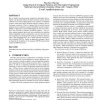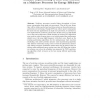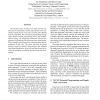148
click to vote
SAC
2008
ACM
15 years 1 months ago
2008
ACM
Model-Driven Engineering (MDE) has been advocated as an effective way to deal with today's software complexity. MDE can be seen as an integrative approach combining existing ...
113
click to vote
SPE
2002
15 years 1 months ago
2002
: The paper presents a hard real-time kernel for distributed computer control systems (DCCS) highlighting a number of novel features, such as integrated scheduling of hard and soft...
104
click to vote
CODES
2001
IEEE
15 years 5 months ago
2001
IEEE
Due to rapidly increasing system complexity, shortening time-tomarket, and growing demand for hard real-time systems, formal methods are becoming indispensable in the synthesis of...
164
click to vote
EUC
2006
Springer
15 years 5 months ago
2006
Springer
Multicore processors promise higher throughput at lower power consumption than single core processors. Thus in the near future they will be widely used in hard real-time systems as...
143
click to vote
ECRTS
2004
IEEE
15 years 5 months ago
2004
IEEE
In this paper we present a concurrency control algorithm that allows co-existence of soft real-time, relational database transactions, and hard real-time database pointer transact...
IPPS
1998
IEEE
15 years 6 months ago
1998
IEEE
The paper introduces a mechanism to implement distributed scheduling for CAN-bus resource in order to meet the requirements of a dynamic distributed real-time system. The key issu...
133
click to vote
AGENTS
1999
Springer
15 years 6 months ago
1999
Springer
We describe the interface between a real-time resource allocation system with an AI planner in order to create fault-tolerant plans that are guaranteed to execute in hard real-tim...
109
click to vote
IPPS
2000
IEEE
15 years 6 months ago
2000
IEEE
For economic reasons, a new trend in the development of distributed hard real-time systems is to rely on the use of CommercialO -The-Shelf
cots
hardware and operating systems. As...
135
click to vote
WORDS
2002
IEEE
15 years 7 months ago
2002
IEEE
Certainly, in hard real-time systems, it is reasonable to argue that no hard real-time threads should behave in an unpredictable way and that schedulability should be guaranteed b...
113
click to vote
WORDS
2003
IEEE
15 years 7 months ago
2003
IEEE
The execution time of software for hard real-time systems must be predictable. Further, safe and not overly pessimistic bounds for the worst-case execution time (WCET) must be com...



